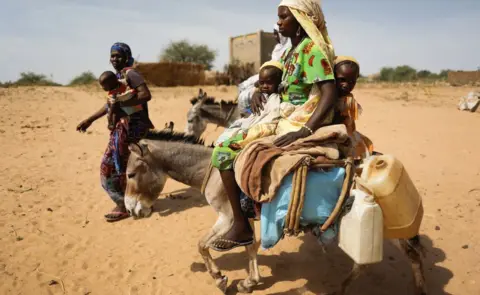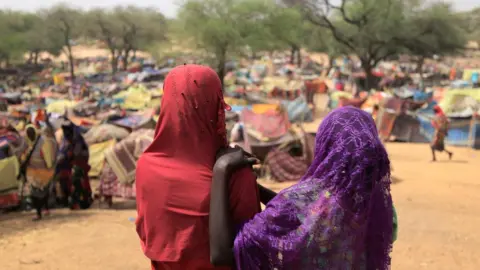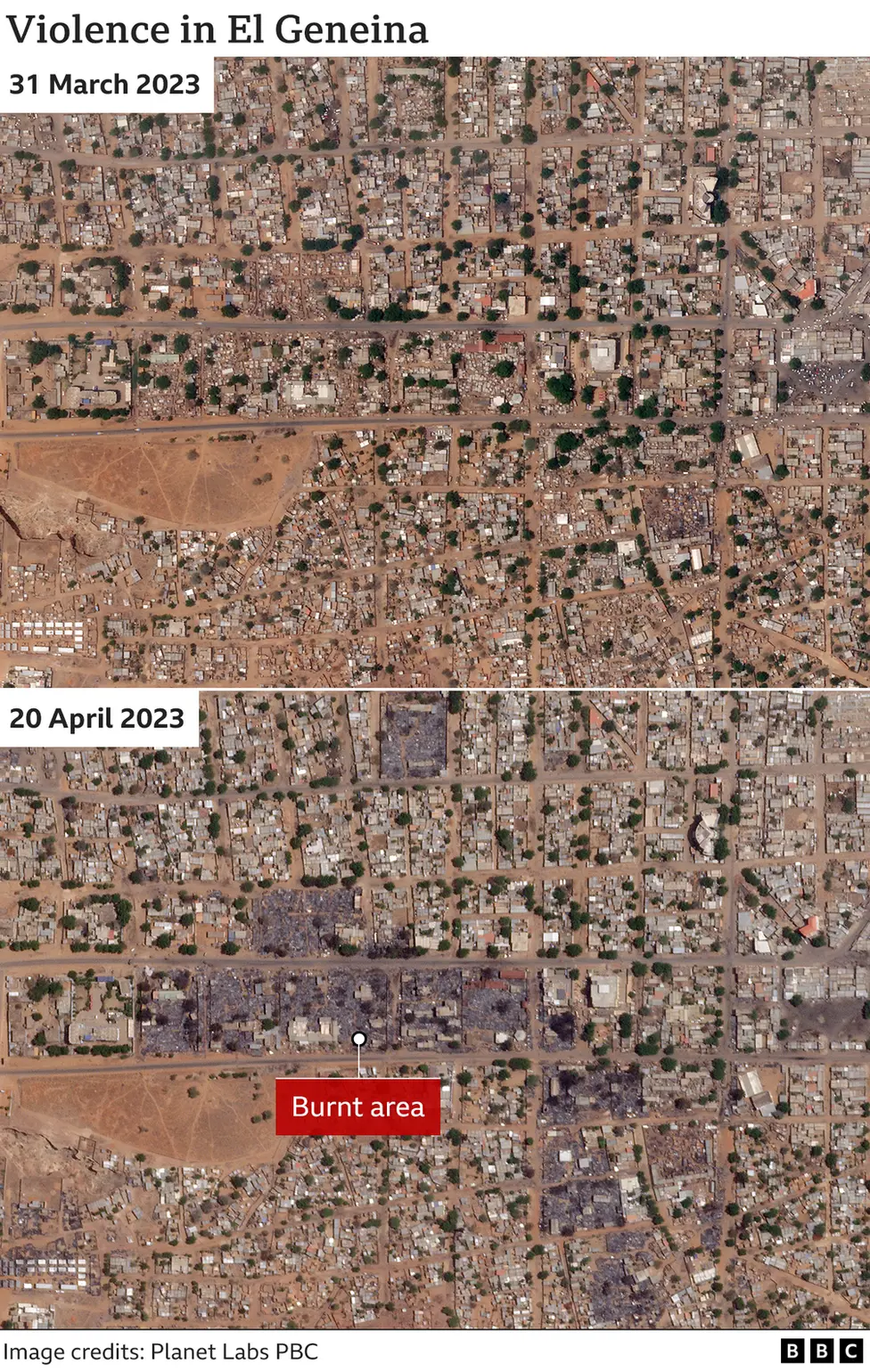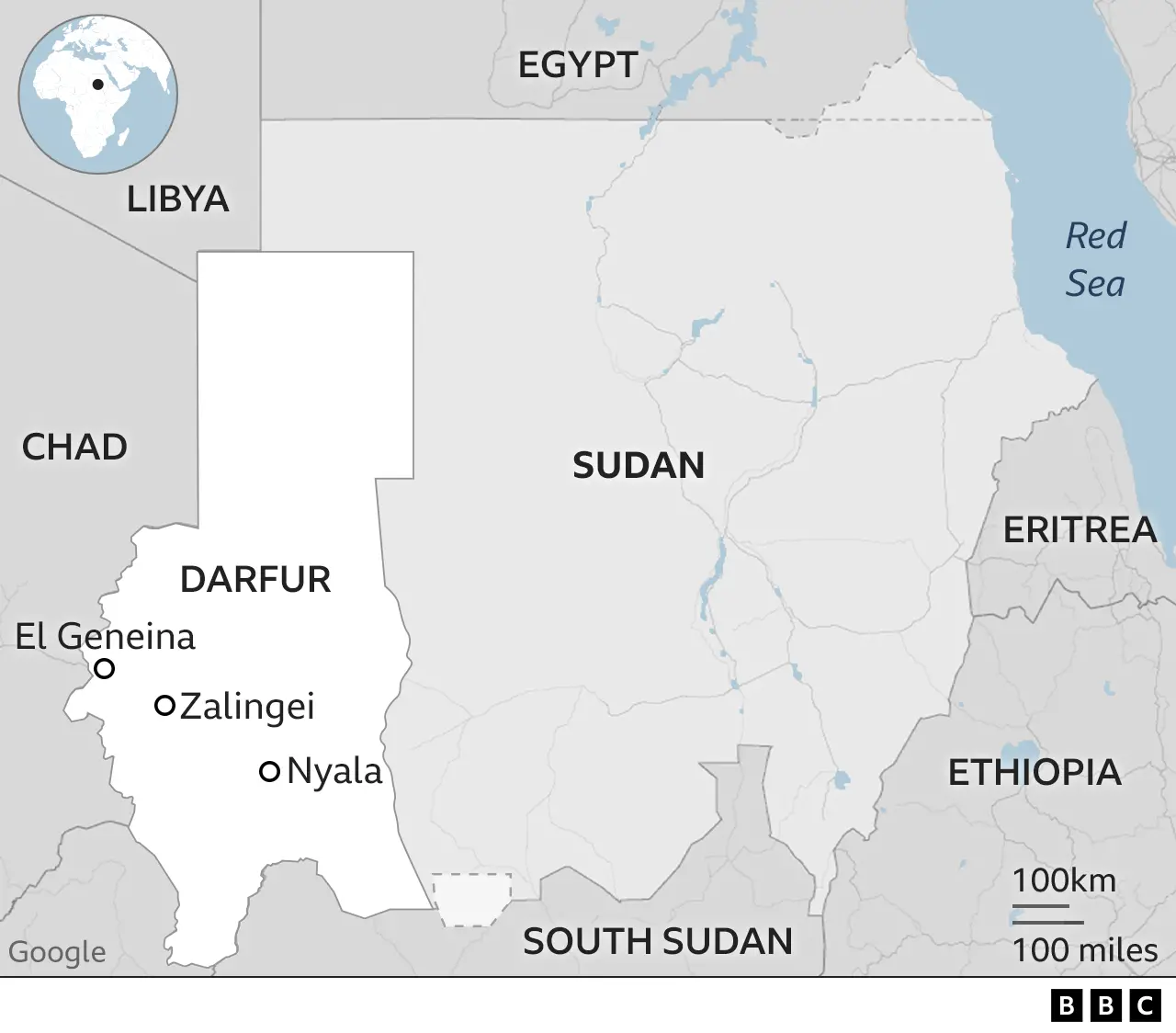Sudan Darfur crisis: 'Everything civilians can use has been burned or destroyed'
 Reuters
ReutersEntire villages in Sudan's West Darfur region have been burned to the ground by marauding militias, with aid agencies now warning the region is on the brink of a "humanitarian catastrophe".
Widespread looting and the destruction of vital infrastructure has left many with little to no access to food, clean water, and medicine.
A ceasefire between the army and the paramilitary Rapid Support Forces (RSF) has led to a lull in the violence around the Sudanese capital, Khartoum.
But fighting has continued in Darfur, and as the conflict there enters its seventh week, the region appears to have plunged into chaos.
Those unable to flee the war have been digging ditches around their neighbourhoods and setting up barricades to keep out militia fighters who have been destroying everything in their path.
That is the picture painted by a local journalist in the city of Nyala, a regional capital.
Satellite images obtained by the BBC confirm that a village near Nyala in South Darfur, Abu Adam, has been completely wiped out by fire - the blackened outline visible from space.


Nyala itself has been suffering from sporadic blackouts and speaking with people inside the city is difficult. Communications have mostly been cut off. But a local journalist, Essa Daffallah, managed to get a message through to me.
"The RSF stormed the city with dozens of pickup trucks mounted with guns, and a large number of motorbikes," he said, adding that on Friday 19 May "NGO offices and shops were looted".
"The hospital was emptied because it was in the fighting zone, most of the pharmacies were looted. All the residential areas in Nyala have been completely sealed off by barricades and digging ditches, so that the militias can't enter the residential districts."
This region was already struggling to assist hundreds of thousands of people displaced by other conflicts.
A local activist in Nyala said more than 600,000 internally displaced people, who relied entirely on humanitarian assistance, have received no aid for 40 days because of the ongoing fighting.

Once again satellite images tell the tale of attacks on essential lifelines for civilians, like the main market - showing that part of it has been destroyed by fire.
That's a huge loss because Nyala supplies the region and even some neighbouring countries.
People are in dire need of help and aid workers are frantically trying to get access to the region. They have gathered in nearby Chad with plans to cross the border into Darfur as soon as they can.
 Reuters
Reuters"We know it is a very high level of risk," says Justine Muzik Piquemal, from the French NGO Solidarités International. "But we need to send humanitarian goods as soon as we can. Because what we are going to find, I think, will be dead bodies everywhere, and no water. No latrines. And no food."
Ms Piquemal has organised 13 tonnes of aid, which she hopes will involve driving a water tank to the city of El Geneina, the capital of Sudan's West Darfur region.
She tells me that lack of fuel there has shut down virtually all the water pumps in a region where temperatures can reach as high as 50C (122F).
Communications with El Geneina have also been very patchy since international humanitarian workers evacuated in mid-April.
But satellite images show how the destruction of the city has advanced: the burnt-out areas are visible from space. They cover all the places where civilian infrastructure once stood, according to Ms Piquemal.


"It's not [just] military places [to be targeted] as we saw in Khartoum at the beginning," she says. "It's more health facilities, schools, mosques, NGO facilities, everything that civilians can use has been burned or destroyed."
Not even food aid has been spared by the looters. Earlier this month, the UN Secretary General António Guterres said that some 17,000 metric tonnes of food had been taken in the first weeks of the fighting.
The town of Zalingei, in Central Darfur, has now become a new epicentre of the fighting. In recent days it went dark with a telecommunications cut-off, under siege by armed militias.
We managed to get a text message from a resident who described a "catastrophic" situation of widespread looting and displacement.
"The most dangerous thing now is that all food supplies have run out," he said.
Many residents say the fighters looting and burning in these cities are connected to the RSF, which has its roots in Darfur.
The leader of the paramilitary group, Gen Hamdan "Hemedti" Dagalo, has called for calm, although he did not specifically address his troops.
"Reject regionalism and tribalism and stop fighting among yourselves now," he said in a recorded message to the people of El Geneina. "Stop fighting among yourselves immediately."
But in El Geneina the conflict lines are blurred: along with the two warring sides, there are different community militias, including civilians who armed themselves in self-defence and ethnic Arab fighters called the Janjaweed - the base from which the RSF was formed.


Twenty years ago, during the war in Darfur, the Janjaweed were mobilised by the former President Omar al-Bashir to crush a rebellion by non-Arab ethnic groups. Hundreds of thousands of people were killed. The Janjaweed were accused of committing war crimes and crimes against humanity.
The current battles have reignited those communal tensions.
"The problem is that it's not just the two parties," says Konstantinos Psykakos, a project co-ordinator from the organisation Médecins Sans Frontières (MSF), whose hospital in El Geneina was attacked and looted.
Mr Psykakos is also waiting at the border in Chad for an opportunity to return, but he is painfully aware of how temporary any such access could be.
"The problem is that you start having inter-communal fights on the ground and you cannot verify when the military party starts and when the communal fight begins," he says.
"The communal fight will not care about humanitarian corridors. That's why everyone says it needs to stop now, because we are at the very peak of the cliff before we start declining in terms of fight and conflict."